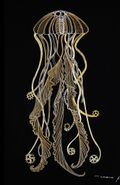Free Expression-Art: Difference between revisions
No edit summary |
|||
| Line 15: | Line 15: | ||
=====Elizabeth Cotten and Rhiannon Giddens===== | =====Elizabeth Cotten and Rhiannon Giddens===== | ||
<embed> https://www.dailykos.com/stories/2020/5/17/1944048/-From-Libba-Cotten-to-Rhiannon-Giddens-the-North-Carolina-Black-folk-tradition-persists </embed> DailyKos 5/17/2020 | |||
"At the age of 11 (a few sources say 12), Elizabeth “Libba” Cotten wrote a song called ”Freight Train,” which would go on to become a folk classic. Yet she didn’t reap the benefits of her lifelong talent until she was 66 years old and a great-grandmother. | "At the age of 11 (a few sources say 12), Elizabeth “Libba” Cotten wrote a song called ”Freight Train,” which would go on to become a folk classic. Yet she didn’t reap the benefits of her lifelong talent until she was 66 years old and a great-grandmother. | ||
Revision as of 10:02, 26 June 2020



Acclaimed Russian director convicted but not sent to prison
<embed> https://abcnews.go.com/Entertainment/wireStory/acclaimed-russian-director-convicted-prison-71474017?cid=clicksource_4380645_2_heads_hero_live_headlines_hed </embed> ABC 6/26/20
The funds were for staging several productions, and investigators initially alleged that the director and his associates stole money through a show that never saw the light of day. In fact, the production was staged to critical acclaim. The investigators later withdrew their claim, and have not since clarified where they believe money was stolen from. Serebrennikov had rejected the accusations as absurd; many in Russia saw the charges as punishment for his anti-establishment views. His productions, ranging from drama to opera and movies, have mocked official lies, corruption and growing social conservatism.
Recording of "Stories of Druid Heights" event
Audio recording of "Stories of Druid Heights" event held at the Mill Valley Public Library on June 25th, 2018. The event was described on the Library website as follows: "Share your stories about the Muir Woods enclave where Alan Watts, Elsa Gidlow and other literary luminaries once lived. Or come and listen as others discuss this unique bohemian community. Author and former Druid Heights resident Hallie Iglehart Austen will moderate." The event begins with an introduction by History Room Librarian Cate Mayfield, followed by a brief talk by National Park Service Park Ranger and Marin Community Liaison Mia Monroe. Monroe provides historical background on Druid Heights and discusses the Golden Gate National Recreation Area's efforts to protect the site. Hallie Iglehart Austen then moderates a series of personal stories from people who lived at or visited Druid Heights during its heyday. Stories include those by: Elaine Belle, Fabrice Florin, Marcelina Martin, Diane McDonald, Roger Packer, Jennifer Spindell, Gerd Stern, and Jan Van Vlaenderen.
Elizabeth Cotten and Rhiannon Giddens
<embed> https://www.dailykos.com/stories/2020/5/17/1944048/-From-Libba-Cotten-to-Rhiannon-Giddens-the-North-Carolina-Black-folk-tradition-persists </embed> DailyKos 5/17/2020
"At the age of 11 (a few sources say 12), Elizabeth “Libba” Cotten wrote a song called ”Freight Train,” which would go on to become a folk classic. Yet she didn’t reap the benefits of her lifelong talent until she was 66 years old and a great-grandmother. Rhiannon Giddens was born Feb. 21, 1977, in Greensboro, North Carolina. A recipient of the prestigious MacArthur Fellowship in 2017, she tells her own story in this short video, including her desire to reclaim the banjo as a key instrument in African American music history."
Yup’ik Masks (Photo Diary)
Native American Net Roots 11/20/2019
For the Central Alaska Yup’ik Eskimo, spirituality was focused largely on the need to secure food for hunting. As with other animistic hunting peoples, animals were felt to have souls which would be reincarnated. Thus, rituals sought to appease the soul of the animal so that it would give itself to the Yup’ik hunters who needed its meat.
Today, many museums consider Yup’ik masks to be works of art. Shown below are some of the Yup’ik masks which have been displayed in the Portland Art Museum and in the Maryhill Museum of Art.
Zombie flu: How the 1919 influenza pandemic fueled the rise of the living dead
In his story “Herbert West: Reanimator,” for example, Lovecraft creates a ghoulish doctor intent on reanimating newly dead corpses. A pandemic arrives that offers him fresh specimens – and that echoes the flu scenes of mass graves, overworked doctors and piles of bodies. When the head doctor of the hospital dies in the outbreak, Dr. West reanimates him, producing a proto-zombie figure that escapes to wreak havoc on the town. The living dead doctor lurches from house to house, ravaging bodies and spreading destruction, a monstrous, visible version of what the flu virus had done worldwide.
The first fairytales were feminist critiques of patriarchy. We need to revive their legacy
But this story is a myth. Fairytales were invented by the blue blood and pomaded sweat of a coterie of 17th century French female writers known as the conteuses, or storytellers......In the closing years of Louis XIV’s reign, French society had become dangerously religious and conservative. Prominent clerics argued for the banning of plays at Versailles, and art forms such as female-authored novels suffered increasing criticism.
